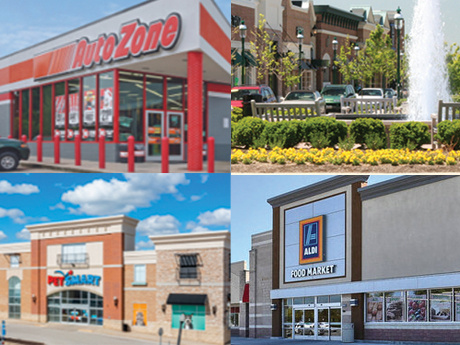The Necessity Retail REIT, Inc. has closed on the acquisition of 77 open-air shopping centers and two single-tenant service retail properties as part of a previously announced 81-property, $1.3 billion portfolio acquisition. A strategic rebranding in February from American Finance Trust reflects a continuing focus on the shopping habits of today’s consumer, says Michael Weil, CEO of The Necessity Retail REIT, Inc. “Where America Shops.”
And where America shops, according to Weil, is in the suburbs.
“Whether they’re on their way home from work or taking the kids to school, it’s very convenient to go to stores in your neighborhood and just get what you need,” he explains. “What we’ve identified is this suburban approach to where America shops.”
Pandemic-, E-Commerce-Resistant Shopping
The new rebrand leaves little to the imagination in terms of what Necessity Retail is targeting, a point Weil is quite proud of.
“We’re really excited because the name does represent what our portfolio is,” he says. “We’ve seen necessity retail come through the pandemic in a really strong position. We’ve found there are communities around the country that are dependent on necessity retail, whether free-standing, grocery-anchored or power center, that’s where America is.”
One of the reasons Weil loves necessity-based retail is its inherent pandemic-proof nature, though he didn’t set out to create a portfolio based on this.
“One of our biggest jobs was to build a portfolio that was recession-resistant,” he notes. “We were always focused on credit underwriting and the business strategies of tenants, which are, of course, important. I never thought I’d be tested by a pandemic. However, we’ve seen how the company and tenants have performed. The lack of bankruptcies. Nearly 100 percent rent collection. This portfolio has been pandemic tested, and it has come through it tremendously.”
Weil points to pharmacies like CVS and Walgreens, home improvement stores like Home Depot and Lowes, gas stations, drive-thrus, auto parts stores and discount retailers like Burlington, DSW and Ross as retailers that successfully served suburban communities during the pandemic. Add all these types of stores up, and you have a formula for a necessity-based victory.
“You can knock out six to eight retailers in one outing,” Weil continues. “You can grab lunch, pick up dry cleaning, get your hair or nails done, then hit Dick’s or Home Depot or Walmart.”
Service-based retailers, along with those that provide the convenience of picking up something quickly along your commute, also make a center e-commerce-resistant.
“There are certainly things you can buy online comfortably,” Weil says. “But there are also many things people have concluded they’d rather pick up themselves. They’d rather go to the grocery store and pick out fruits, vegetables, meat and dairy, and that’s been a great thing to watch. If they get sick, they’d rather just run down to their pharmacy and grab the medication than wait for it to be shipped to them. If it’s the weekend and they’re working on their car and they realize they don’t have the right air filter or oil filter, they don’t have time to go order it online. It’s easier to go to an O’Reilly or AutoZone, get what they need, then come home and finish their project.”
The Business of Relationships
Another way to pandemic proof your portfolio, Weil suggests, is to maintain a good relationship with your tenants. The time to get to know them is well before when a problem occurs.
“One of the things that’s really helped us get through the past couple years is we had a great relationship with our tenants,” he says. “We knew them, they knew us and everyone understood what that relationship was: we provide great space in a safe, clean, well-positioned open-air center, and they pay their rent. For us, the pandemic meant going from asset managers to very active asset managers.”
Weil says his team was already well acquainted with tenants that were working on renewals, extensions and new locations. He also likes to get to know the tenants’ real estate teams at the corporate level (when applicable).
Weil and his team are about to do a lot more handshaking as they get acquainted with the real estate departments at the 81 properties Necessity Retail REIT is nearly finished acquiring. As previously mentioned, the company has closed on 77 open-air centers for a total of $1.1 billion earlier this year.
The REIT expects to acquire the two remaining properties by the end of second-quarter 2022. Once this transaction closes, the company will be the preeminent REIT focused on necessity-based retail with a best-in-class portfolio that will comprise more than 1,000 properties, 29 million square feet and $387.6 million in pro-forma annualized straight-line rent. About half of these assets are in high-growth markets, primarily in the Sun Belt.
“Our portfolio will be increasingly representative of where America shops every day, including a significant concentration on desirable grocery-anchored shopping centers,” Weil adds. “As we think about the portfolio, we think about the tenants and the customers they serve. Those are the things that line up really nicely. If our tenants are happy and their customers are happy, then we’re going to continue to lease space and grow our portfolio, which, at the end of the day, is what our shareholders are expecting us to do. The renaissance of retail is in full swing, and we’re thrilled to be a part of it.”
— By Nellie Day. This post is posted as part of Shopping Center Business’ Retail Insight series. Click here to subscribe to the Retail Insight newsletter, a four-part newsletter series, followed by video interviews delivered to your inbox in May/June.


